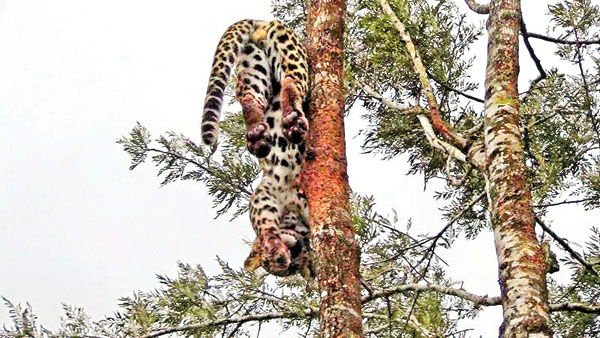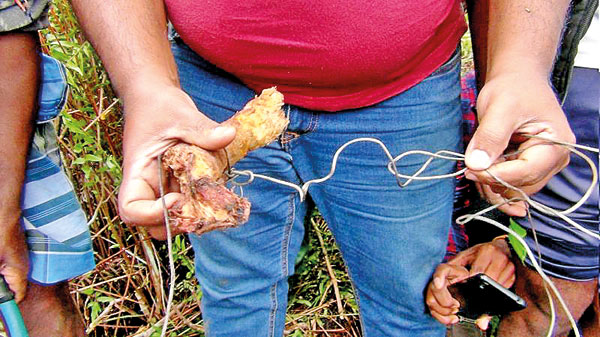News
Snares in plantations, land seizures put leopards in peril
View(s):By Kasun Warakapitiya and Senuka Jayakody
People in the hill country plantations should be prevented from encroaching on forest land, setting up snares to trap wildlife, and from continuing to raise farm animals, so that tragedies involving leopards can be avoided, environmentalists say.
A video clip of a botched rescue attempt in Vanaraja Estate in Hatton where a leopard — wounded and bleeding — was seen hanging in a tree with a snare tightened at its waist, has triggered wide condemnation. The tree was felled by wildlife officers and the animal died.
Plantation dwellers in the area have been illegally setting up animal traps to hunt game and to capture leopards looking for prey among domesticated animals.

Vanaraja Estate in Hatton: Wounded and bleeding the leopard was seen hanging in a tree with a snare tightened at its waist. Pix by K. Krishanthan
Environmental activist, Ven Pahiyangala Ananada Sagara thera told the Sunday Times that officers of the Department of Wildlife Conservation are merely using outdated tactics and making silly decisions.
“Punishment is not enough. The DWC should train their officers to avoid a repeat,” he said.
He said the ministry has been asked to halt plantation workers from encroaching on forest lands and to remove animal farms to reduce leopard encounters. Also, researcher and convener of the Biodiversity Conservation Research Circle, Supun Lahiru Prakash said the DWC is short of resources, infrastructure, training, and staff, but the authorities are not concerned.
“The lack of professionalism is showcased in such incidents. They did not comply with international protocol and disperse the people to avoid harm to them and the animal,’’ he said.

The botched up rescue attempt (top) and the snare that had fatally wounded the animal
He also pointed out that Nepal was able to double the number of tigers (panthera tigris tigris), but the Department of Wildlife is unable to even give the exact number of endemic Sri Lankan leopards (panthera pardus kotiya).
Residents have been complaining of leopard sightings. Last week, a large male leopard landed inside a house after it fell through the roof in the Lindula area.The leopard was rescued by Nuwara Eliya wildlife officers after a 16-hour operation.
The Nuwara Eliya District Secretary, G. K. G. A. R. P. K. Nandana said leopards in mountains come down to the plains and cleared areas when prey is scarce.
“Leopards looking for prey enter estates to hunt dogs, goats, calves and even ransack chicken coops. When this happens, the leopards also get caught in traps set for other animals,’’ he said.
He said people will be told to stop setting up animal traps. Also, the ministry has been asked to open a wildlife centre in Nuwara Eliya. At the moment, the closest wildlife office is in Randenigala.He said human settlements have fragmented the forest lands and is forcing leopards to venture into the villages.
Referring to the Vanaraja Estate incident wildlife officers said their main objective was to get the animal on the ground.
All Island Combined Wildlife Officers Union president, Prabash Karunathilake pointed out that the trap had slipped around the animal’s hind legs, near the waist, damaging its renal area. So they decided to cut down the tree and free the animal quickly. Tranquilising an animal could be risky, depending on the circumstances, he said. 
Besides, the wildlife veterinary surgeon was at Randenigala, which is 170 kilometres from Hatton. His arrival was also delayed.
Mr. Karunathilake also said the leopard was already in peril when officers reached the area, so they chopped down the tree. The struggling animal could have inflicted itself more damage, they had thought.
He complained that the lack of equipment, fuel scarcity as well as not designating wildlife as an essential service had made the situation worse.
DWC Director General Chandana Suriyabandara explained that the number of leopards range between 600 and 1,000. It is believed to be below 1,000, he said.
Mr Suriyabandara said that the incident last Sunday occurred as a result of a leopard getting trapped in a snare set up for wild boar. Most people living in and near plantations set up traps to protect their vegetable cultivations and to hunt wild game. “People set up these traps on heavy logs so the animals get ensnared, they drag them and eventually get stuck on rocks, or between trees. Then the struggling animal gets injured and is eventually killed. The male tiger cub too was caught in such a trap and had got stuck on the tree,” he said.
Mr Suriyabandara said that he is unable to discuss the issue due to the investigation.
According to the officers, they had been alerted at about 9 am on Sunday, although people had seen the animal at about 7 am, he said.
“Our officers said that the animal was near death as it had struggled a lot and injured itself. It was bleeding from its mouth and nose. It was even bleeding from its claws.”
He explained that officers and doctors are reluctant to tranquilise animals which are in poor health. He admitted that the DWC veterinary officer spent another three hours trying to reach the area. So they had wanted to cut the tree and free the animal as soon as possible.
Mr Suriyabandara admitted that there are only 16 wildlife veterinary surgeons in the department covering islandwide hotspots.
He said veterinary surgeons are required to check the health of the eco systems and animal species and not individual animals. So, the number of officers is adequate. 
Wildlife and Forest Resources Conservation Minister Mahinda Amaraweera told the Sunday Times, a ministry team led by an additional secretary will investigate.
He has asked officials to focus on what the officers had said.
“The officers have said they do not have enough equipment. However, pliers, and a strong rope are not expensive. I need to learn if what they say is true and the DWC is incapable even getting that. DWC’s director general assured me there are no shortages of equipment,” he said.
The best way to say that you found the home of your dreams is by finding it on Hitad.lk. We have listings for apartments for sale or rent in Sri Lanka, no matter what locale you're looking for! Whether you live in Colombo, Galle, Kandy, Matara, Jaffna and more - we've got them all!

